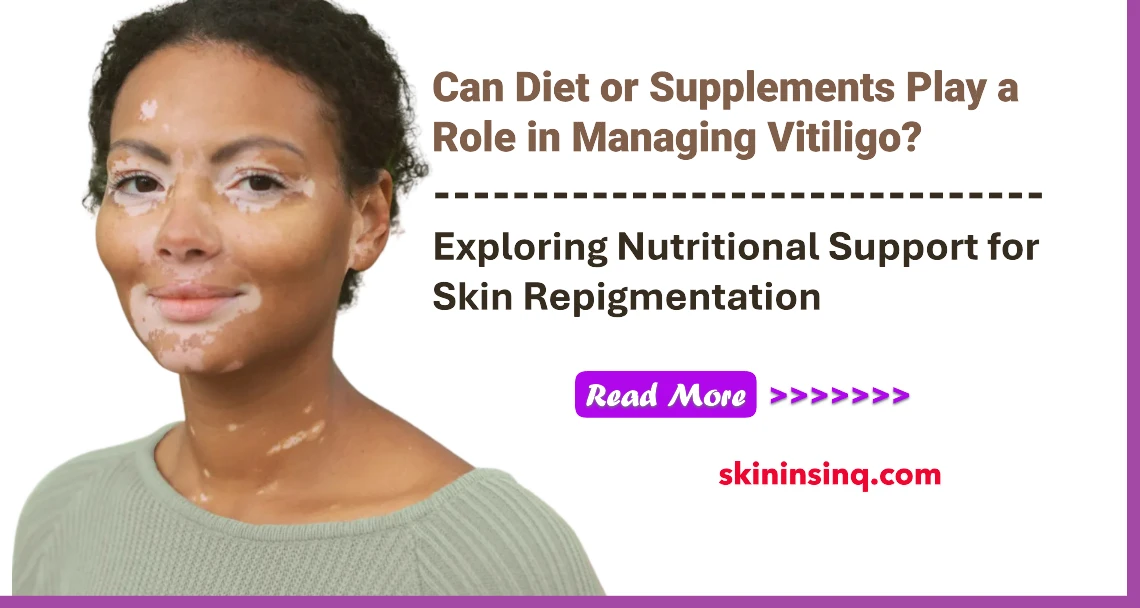Can Diet or Supplements Play a Role in Managing Vitiligo? Exploring Nutritional Support for Skin Repigmentation
Can Diet or Supplements Play a Role in Managing Vitiligo? Exploring Nutritional Support for Skin Repigmentation
Vitiligo is a skin condition marked by the loss of melanin, the pigment that gives color to the skin. It occurs when melanocytes—the pigment-producing cells—are destroyed or stop functioning. While medical treatments such as topical corticosteroids, phototherapy, and surgical options are commonly used, many individuals also explore complementary approaches like diet and nutritional supplements to support their skin health and repigmentation. But can what you eat or the supplements you take really influence vitiligo? Let’s explore.
The Role of Nutrition in Vitiligo
There is no specific diet that can cure vitiligo, but research suggests that certain nutrients may help manage oxidative stress, support immune function, and possibly aid in repigmentation. Since oxidative damage and autoimmune factors are believed to play a key role in the progression of vitiligo, a diet rich in antioxidants, vitamins, and minerals may be beneficial.
1. Antioxidant-Rich Foods
People with vitiligo often have elevated levels of oxidative stress in the skin. Antioxidants help neutralize free radicals that can damage melanocytes. Foods high in antioxidants include:
-
Colorful fruits and vegetables (berries, carrots, spinach)
-
Green tea
-
Nuts and seeds
-
Whole grains
2. Vitamin B12 and Folic Acid
Some studies have found that individuals with vitiligo have lower levels of vitamin B12 and folic acid. Supplementing these nutrients—especially when combined with sun exposure—has been linked to repigmentation in some cases.
3. Vitamin C and E
Both are powerful antioxidants that may help protect melanocytes and reduce skin damage. Including citrus fruits, almonds, sunflower seeds, and green vegetables in your diet can help maintain healthy skin.
4. Zinc and Copper
These trace minerals play a role in melanin production and immune function. Zinc can be found in legumes, nuts, and whole grains, while copper-rich foods include shellfish, seeds, and leafy greens.
5. L-Phenylalanine
This is an essential amino acid involved in melanin synthesis. Some research has suggested that supplementing with L-phenylalanine alongside UV therapy may improve pigmentation outcomes.
Supplements That May Support Vitiligo Management
Some supplements commonly explored for vitiligo management include:
-
Vitamin B12 and folic acid (often combined)
-
Zinc and copper supplements
-
L-phenylalanine
-
Ginkgo biloba – May have antioxidant and immunomodulatory effects
-
Omega-3 fatty acids – Help reduce inflammation
It’s important to consult a healthcare provider before starting any supplements, as improper dosages or interactions with medications can lead to adverse effects.
What to Avoid
Some experts suggest avoiding foods that may trigger immune responses or increase oxidative stress, such as:
-
Processed and fried foods
-
Excess sugar
-
Gluten (for those with gluten sensitivity)
-
Alcohol and caffeine (in excessive amounts)
Final Thoughts
While diet and supplements are not a cure for vitiligo, they can play a supportive role in overall skin health, immune regulation, and possibly slowing the progression of depigmentation. A balanced diet rich in vitamins, minerals, and antioxidants may complement medical treatments and improve quality of life. Always consult with a dermatologist or nutritionist before making significant dietary changes or starting new supplements.

Related Blog
What Causes Oily Skin and Can It Be Managed Naturally? Exploring Root Causes and Gentle Solutions
Aug 2, 2025 by Admin
General
What Are the Signs That You Have Sensitive Skin? Key Symptoms to Help You Identify This Delicate Skin Type
Aug 1, 2025 by Admin
General